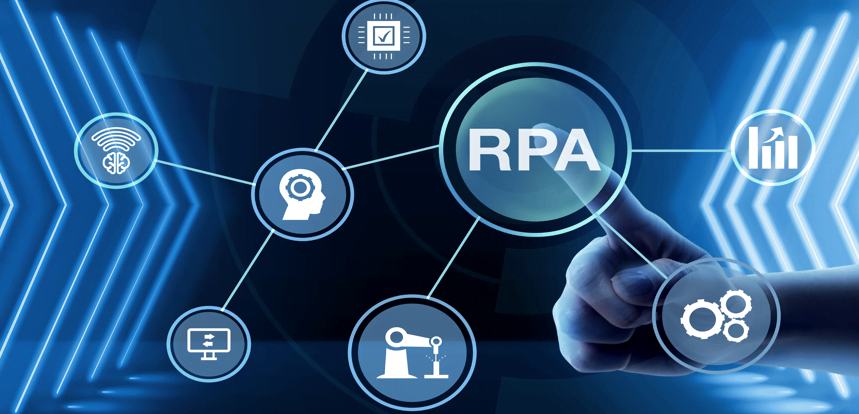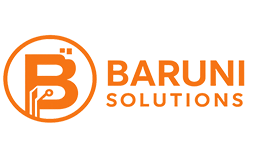
Our RPA Development Services
At Baruni Solutions, our RPA experts deliver thorough analysis, identify automation opportunities, and craft bespoke solutions to enhance business processes and maximize ROI.
RPA Consulting
We begin our RPA consulting with a meticulous assessment of your current workflows. We then devise the best RPA deployment strategy and develop a comprehensive implementation roadmap. By setting clear project milestones, defining robust frameworks, and applying effective methodologies, we ensure the seamless integration of RPA into your operations.
Bot Implementation
Our engineering team constructs a resilient RPA infrastructure that ensures stability, interoperability, and scalability. We create RPA modules that integrate effortlessly into your existing workflows. Through rigorous testing, we guarantee a bug-free experience, and we provide thorough end-user training to ensure a smooth transition to the new RPA system.
RPA Maintenance
Post-deployment, our RPA specialists provide extensive support and hypercare to fine-tune and optimize your RPA tools. We continuously analyze user feedback to enhance the RPA solution and create a backlog for future updates. As your business evolves, we assist with further RPA integrations, ensuring sustained operational efficiency and long-term success of your automated processes.
Let's Discuss Your Project
Get free consultation and let us know your project idea to turn it into an amazing digital product.
Get StartedBringing Innovation with the Latest Tech Stack
Our RPA development team possesses extensive technology expertise and is adept at handling a wide range of project requirements, from simple to complex, with ease
- Softomotive
- Blue Prism
- UiPath
- WorkFusion
- Pega
- Kofax
- AntWorks
- Automation Anywhere
- Azure Logic Apps
- Microsoft Flow
- SAP
- Dialogflow
- Azure Automation
- Amazon LEX
- Microsoft Bot Framework
- Catalytic
- Kryon

Business Benefits of RPA
Improve the efficiency and accuracy of business processes with Robotic Process Automation (RPA). Here are the key benefits RPA offers to businesses:
Increased Efficiency
RPA automates tedious, time-consuming, and error-prone tasks, thereby enhancing process efficiency.
Reduced Costs
Automation reduces costs associated with human labor and minimizes the need for hardware and software licenses.
Improved Accuracy
Automated processes significantly reduce errors, resulting in less wasted time and resources.
Greater Scalability
RPA can manage increased workloads without additional manpower, simplifying business scaling.
Enhanced User Experience
RPA improves user experience by handling human interactions automatically, allowing employees to focus on value-added tasks.
Better Business Agility
RPA enables rapid process automation, allowing organizations to respond quickly to market opportunities and threats.
Leading the Charge in RPA Services
At Baruni Solutions, we empower businesses globally to scale, innovate, and achieve a competitive edge through our top-tier RPA consulting services
Whether you're a startup, enterprise, product company, digital agency, SME, or government organization, we meet your diverse technology needs with unparalleled expertise. Our industry recognition is built on these key differentiators:
- India’s Top 1% Software Experts
- Endorsed by Startups and Fortune 500 Companies
- Full-Cycle Services: From Concept to Deployment
- Time-Zone Aligned: Global Reach and Presence
- Uncompromised Data Security Protocols
- Punctual Delivery with No Surprises
- Premier mobile app development authority
Got a Project in Mind? Tell Us More
Drop us a line and we'll get back to you immediately to schedule a call and discuss your needs personally
Get StartedRobotic Process Automation (RPA) Development
Guide Topics
What is RPA Development?

RPA development involves designing, building, and deploying Robotic Process Automation (RPA) solutions. This process includes creating software robots, or "bots," that automate repetitive, rule-based tasks traditionally performed by humans. The goal of RPA development is to streamline business processes, boost efficiency, and minimize manual effort by leveraging intelligent automation.
Steps in RPA Development:
- Requirement Analysis: The development team collaborates with stakeholders to understand specific processes, tasks, and goals that need automation. They identify areas where RPA can add value and define the scope of the automation project.
- Process Mapping: The team documents the targeted processes, detailing the steps, inputs and outputs, decision points, and rules. This mapping provides a clear picture of the tasks the bots need to perform.
- Designing the RPA Solution: Based on the process mapping, the team designs the RPA solution. This includes selecting suitable RPA tools and platforms, defining workflows, creating automation scripts, and configuring the system to interact with various applications.
- Development and Testing: The bots are developed using RPA tools and programming languages. They are programmed to execute the identified tasks and interact with necessary systems. Extensive testing ensures the solution is accurate, reliable, and efficient.
- Deployment and Integration: The RPA solution is deployed in the target environment, often involving integration with existing systems, databases, or applications. Security measures are implemented to protect data and ensure regulatory compliance.
- Monitoring and Maintenance: Post-deployment, the RPA solution is monitored for performance and potential issues. Ongoing maintenance and updates are performed to adapt to changes in the processes or systems being automated.
RPA development requires technical expertise, process knowledge, and stakeholder collaboration. Effective RPA solutions streamline operations, boost productivity, reduce errors, and allow human resources to focus on strategic tasks.
RPA Market Overview
- The global Robotic Process Automation (RPA) market is projected to reach $31 billion by 2030. – Research and Markets
- 70% of organizations have started implementing automation technologies, with many in the pilot phase. – McKinsey
- 95% of businesses view automation as a crucial element in their digital transformation strategies. – Automation Anywhere
Types of RPA

RPA, or Robotic Process Automation, can be categorized into three main types:
- Unattended RPA: Automates processes that run without human intervention. These bots perform tasks in the background, typically in server environments. Ideal for repetitive, rule-based tasks requiring minimal human decision-making.
- Attended RPA: Works in collaboration with human users, assisting and augmenting tasks in real-time. Operates on the user’s workstation, triggered manually or by specific events, providing on-demand support for complex tasks requiring human judgment.
- Hybrid RPA: Combines unattended and attended RPA features, enabling end-to-end process automation. This approach leverages unattended bots for high-volume, rule-based tasks while incorporating attended bots for tasks needing human input, optimizing efficiency and productivity.
RPA vs. Traditional Software Development
RPA development differs from traditional software development in several ways:
- Time to Market: RPA solutions can be developed and deployed quickly, with visual and code-free tools enabling faster development cycles.
- Flexibility and Agility: RPA solutions are highly adaptable to changing business requirements, interacting with various systems without extensive integration efforts.
- Non-Invasive Integration: RPA integrates with existing systems without significant changes, making it compatible with legacy systems and allowing seamless integration.
- User Interface Automation: RPA mimics human actions, interacting with applications by clicking buttons, entering data, and retrieving information.
- Scope of Automation: RPA is ideal for automating repetitive, rule-based tasks, whereas traditional software development allows for extensive customization and complex functionalities.
- Cost and Maintenance: RPA development often involves lower costs, with a visual approach and reusable components reducing development and maintenance expenses.
Enhanced RPA Integrations for Added Value

Integrating artificial intelligence technologies with RPA enhances its capabilities, converting processed data into actionable insights. Valuable RPA integrations include:
- Optical Character Recognition (OCR): Enables RPA to handle document scanning, text recognition, and transformation into editable formats, extracting valuable information for automated processes.
- Natural Language Processing (NLP): Allows RPA to understand and interpret written and spoken language, analyzing text data sources and deriving meaningful insights.
- Machine Learning (ML): Empowers RPA systems to learn and adapt independently, handling diverse scenarios without explicit programming for each situation.
- Computer Vision (CV): Enables RPA bots to "see" and understand elements within interfaces, automating processes involving visual recognition and interacting with on-screen elements accurately.
These integrations significantly enhance RPA functionality, opening new automation and intelligent decision-making opportunities
Explore Our Flexible Hiring Models
At Baruni Solutions, we provide a range of hiring models tailored to your specific requirements:

Dedicated Team
Our dedicated teams comprise seasoned professionals, including project managers, software engineers, QA engineers, and other specialists. These autonomous teams deliver technology solutions swiftly and efficiently. Each role is meticulously defined for the project, with management conducted collaboratively by a Scrum Master and the client's product owner.
- Agile methodologies
- Transparent pricing
- Monthly billing
- Maximum flexibility
- Perfect for startups, MVPs, and software companies.

Team Augmentation
Ideal for businesses and projects of all sizes, team augmentation adds the necessary talent to your team to fill skill gaps. Augmented team members integrate seamlessly with your local or distributed teams, attending daily meetings and reporting directly to your managers. This model allows for immediate and on-demand scaling.
- On-demand scaling
- Quick & cost-effective
- Monthly billing
- Eliminate hiring hassles
- Transparent pricing

Project-Based
For projects with clearly defined specifications, scope, deliverables, and acceptance criteria, we offer a fixed quote. This model is ideal for small to mid-scale projects with well-documented requirements.
Time & Material Model:For projects with evolving scope requirements or complex business needs, we offer a time and material model. Developers are hired based on the time spent on the project, ensuring flexibility and adaptability.Flexible scope, Cost-effective for dynamic requirements and Hire developers.
Frequently Asked Questions
Answer. You should hire Baruni Solutions because we have a team of experienced RPA consultants who can help your business build smart bots and solutions tailored to your needs. Here are some key reasons to choose us for RPA services:
- Proven track record of delivering successful RPA projects for our clients.
- Highly skilled and experienced RPA professionals who deliver quality work on time and within budget
- Flexible engagement models customized to meet your specific requirements.
- Competitive pricing for all our RPA services
- Commitment to the highest level of customer satisfaction
We have provided RPA services to various industries, including healthcare, accounting, and financial services
Answer. The cost of RPA development services depends on several factors, including:
- Features to be updated
- Fixes required for the app
- Number of apps on your server/device
- Choice of engagement model
- Total man-hours
- Technology stack used
For a detailed cost estimate, please contact us directly
Answer. Yes, RPA services can significantly increase workforce efficiency by automating repetitive tasks, reducing errors, and freeing up employees to focus on more strategic and value-added activities.
Answer. The development and deployment timeline for an RPA solution can vary depending on the complexity of the process. However, at Baruni Solutions, we follow agile methodologies to deliver efficient and timely results.
Answer. RPA development can benefit organizations across various industries and sectors, including enterprises, startups, and digital agencies. It is suitable for organizations of all sizes seeking to streamline processes and achieve operational excellence
Answer. Yes, at Baruni Solutions, we provide comprehensive support and maintenance services to ensure the smooth functioning of RPA solutions. Our dedicated support team is available to address any issues and provide timely assistance
Client Feedback on Our Services
We sincerely appreciate the trust our clients place in us and take pride in providing quality solutions that surpass their expectations. Here's what some of them have to say about their experiences:
Collaborating with Baruni has been fulfilling; their innovative, practical software solutions consistently deliver outstanding results.
Baruni provided a reliable, scalable software solution; their team's remarkable expertise ensured seamless project execution.
Baruni crafted a software solution tailored to our needs; their pivotal role ensured the project's success.
Partnering with Baruni has been gratifying; their team's exceptional skillset consistently delivers impressive results.
Baruni’s creative software engineering approach significantly improved our business operations .
Baruni's high-quality software solutions make them our preferred development partner.





